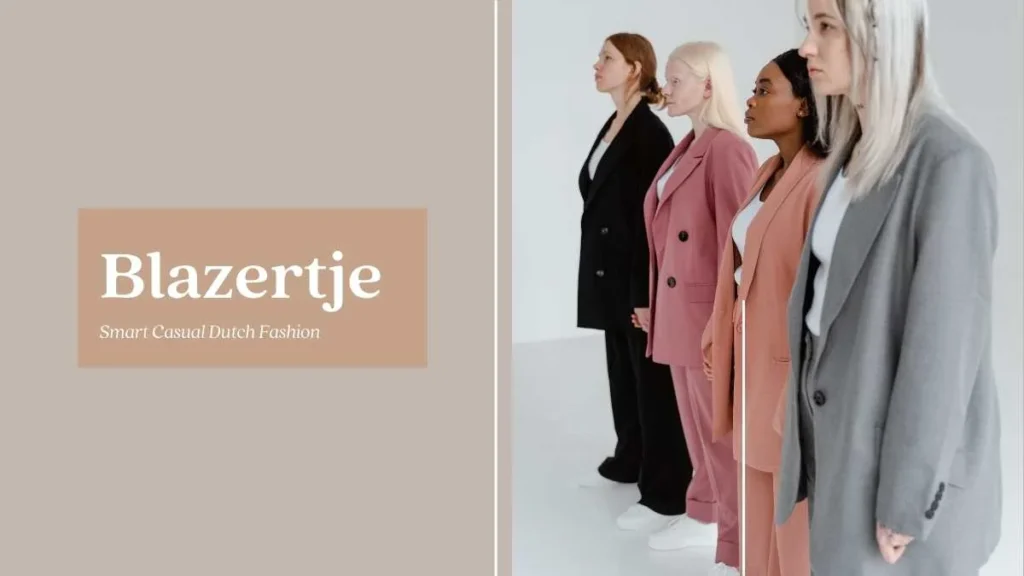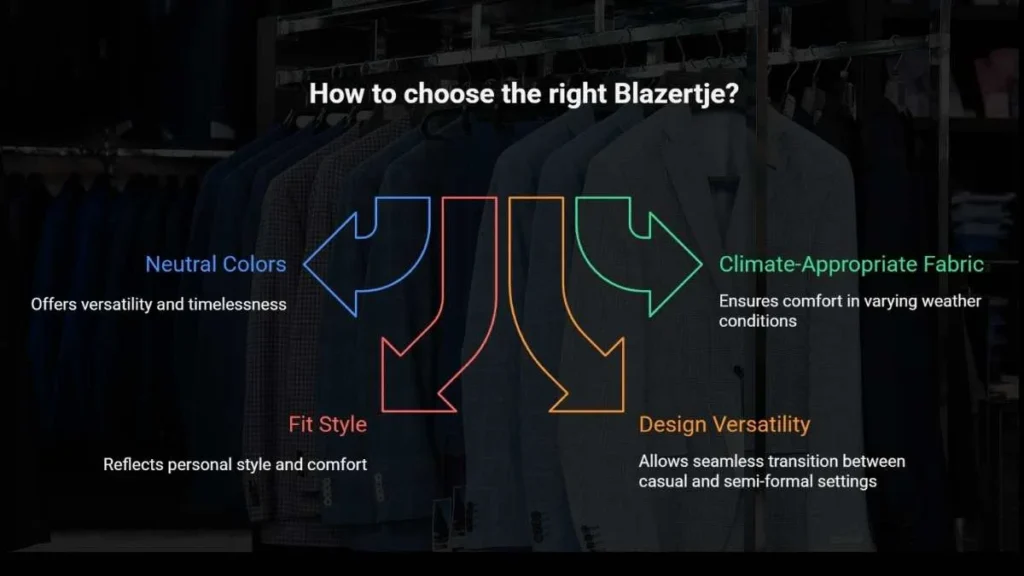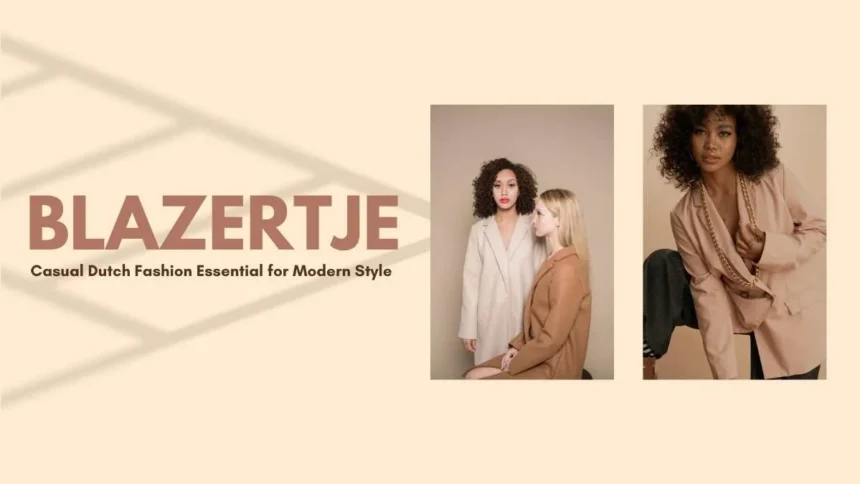Blazertje is a Dutch word that means “little blazer” or “casual blazer.” Unlike a traditional blazer that feels formal and structured, a blazertje is lighter, more flexible, and designed for everyday wear. It blends the sophistication of a blazer with the comfort of casual outerwear, making it the perfect middle ground between formal and relaxed dressing.
- The Origin and Meaning of Blazertje
- What Makes a Blazertje Different from a Blazer?
- Popular Fabrics and Seasonal Variations
- The Cultural Significance of Dutch Blazers
- Styling the Blazer for Different Occasions
- Practical Benefits of Owning a Blazer
- Global Fashion Influence
- Tips for Buying the Right One
- FAQs
- Conclusion
In fashion, a blazertje is considered a versatile staple. It is often made from fabrics like cotton, jersey, or linen, and comes in slimmer or oversized fits that adapt to multiple occasions. Easy to style, comfortable to wear, and globally relevant, it represents a modern shift toward practical yet stylish clothing.
The Origin and Meaning of Blazertje
The word blazertje comes from the Dutch diminutive form of “blazer,” which makes it both descriptive and endearing. It implies something more approachable, smaller, and lighter than the classic blazer. In Dutch fashion culture, a blazertje is understood as a piece that blends casual wear with refined tailoring, not too formal, yet not too laid-back.

Traditionally, blazers were seen as symbols of formality, often worn as part of business suits or uniforms. However, the Dutch interpretation softened this rigid image. It became a relaxed blazer alternative, designed for everyday life, where flexibility and comfort are just as important as style.
What Makes a Blazertje Different from a Blazer?
At first glance, it might look like a standard blazer, but closer inspection reveals several key differences:
Fabric Choice
While blazers are typically made from wool or heavy suiting materials, blazertjes are often crafted from lighter, softer fabrics like cotton, jersey, or linen. This makes them more breathable and suitable for long wear.
Fit and Structure
A traditional blazer emphasizes structure, with shoulder padding and sharp tailoring. In contrast, a blazertje comes in slimmer, softer fits or even trendy oversized cuts, prioritizing comfort over stiffness.
Styling Versatility
The blazertje is less restrictive in how it can be worn. It pairs just as well with jeans and sneakers as it does with dress pants or skirts, making it a cross-occasion piece.
Popular Fabrics and Seasonal Variations
| Fabric Type | Features | Best Season | Styling Notes |
| Cotton | Breathable, soft | Spring/Summer | Ideal for casual looks |
| Jersey | Stretchy, flexible | All-year | Works well for travel |
| Linen | Airy, lightweight | Summer | Pairs with light trousers |
| Velvet/Corduroy | Textured, warm | Autumn/Winter | Adds richness to evening wear |
The Cultural Significance of Dutch Blazers
Fashion is not only about clothing but also about lifestyle and identity. The blazertje represents a shift toward modern individuality, where people seek a balance between elegance and self-expression.
In Dutch culture, practicality and style go hand in hand. A blazertje embodies this cultural approach; it’s stylish enough to wear to dinner but relaxed enough for a bike ride through Amsterdam. This cultural balance is spreading internationally, where more consumers value comfort, sustainability, and functionality in fashion.
Styling the Blazer for Different Occasions
One of the biggest reasons for the blazertje’s popularity is its unmatched versatility. It can adapt to casual, semi-formal, or even professional contexts depending on how it’s styled.
1. Everyday Casual
Pair a cotton blazer with jeans, a plain T-shirt, and sneakers. This creates a clean, relaxed look suitable for coffee runs, shopping, or casual hangouts.
2. Smart Casual
Style a linen or jersey blazertje with chinos or tailored trousers. Add loafers or ankle boots to elevate the outfit. Perfect for work-from-home meetings, casual Fridays, or dinner dates.
3. Professional Settings
Choose a structured blazer in a neutral color like navy, grey, or black. Pair it with dress pants or a pencil skirt. This offers the sophistication of a blazer without the stiffness.
Practical Benefits of Owning a Blazer
- Year-round utility with fabric variations.
- Travel-friendly, easy to pack, and wear.
- Cost-effective wardrobe staple.
- Fashion-forward yet timeless in design.
Global Fashion Influence
While rooted in Dutch culture, the concept of the blazertje has gone global. From European runways to American street style, designers and influencers highlight blazers as part of the “relaxed tailoring” movement. Luxury brands like Isabel Marant, Acne Studios, and even Zara’s high-street collections feature versions of the blazertje, proving its universal appeal.
Social media platforms have further accelerated their popularity. Influencers showcase creative ways to style it, proving they can be dressed up or down for travel, work, and leisure.
Tips for Buying the Right One
- Start with neutral colors like navy, beige, or black.
- Choose a fabric that matches your climate.
- Decide between slim-fit or oversized cuts depending on your style.
- Look for designs that transition between casual and semi-formal.

FAQs
Q1: Can a blazertje be worn in formal meetings?
Yes, when styled in neutral colors and paired with tailored trousers.
Q2: How should I care for a linen blazertje?
Dry clean or gentle wash, and always hang to avoid wrinkles.
Q3: Is a blazertje suitable for travel?
Absolutely, it’s lightweight, flexible, and easy to pack.
Conclusion
The blazertje is more than just a Dutch fashion term; it is a symbol of how modern style balances tradition and innovation. Combining the sophistication of a blazer with the ease of casual wear, it represents a new way of dressing: practical, versatile, and effortlessly stylish.
Whether you’re dressing for a meeting, a casual outing, or an evening dinner, it adapts seamlessly, proving that true style lies in comfort, adaptability, and timeless design.
For anyone building a wardrobe that values both elegance and ease, investing in a blazertje is not just a trend; it’s a lifestyle choice.






